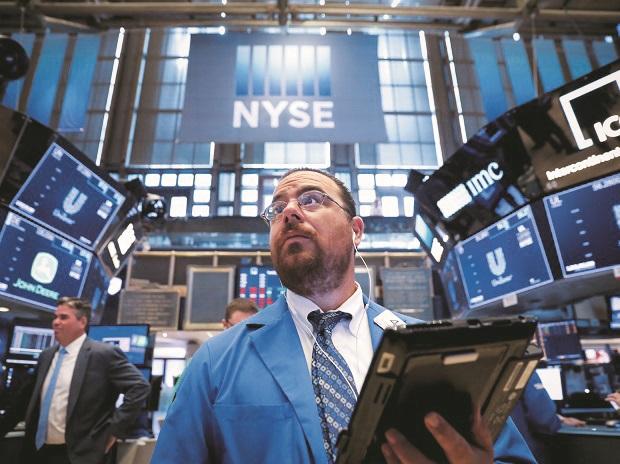US futures tumble as soaring energy prices fuel inflation worries

U.S. stock index futures fell more than 1% on Wednesday after soaring oil prices fed into fears of higher inflation and fueled concerns of sooner-than-expected easing of the Federal Reserve’s monetary stimulus.
The benchmark U.S. 10-year yield touched their highest since June, slamming shares of mega-cap growth companies including Apple Inc, Facebook, Amazon.com Inc and Alphabet Inc, which fell about 1.5% each in premarket trading after staging a strong rebound on Tuesday.
Economy-sensitive parts of the market also came under pressure, with lenders such as Bank of America Corp, JPMorgan Chase & Co and Morgan Stanley shedding more than 1% each.
Planemaker Boeing Co as well as industrial conglomerates CaterpillarInc and 3M Co dropped between 0.8% and 2.0%.
Asian and European stocks fell earlier in the day as oil hit a multi-year high above $83 a barrel amid a rally in global energy prices, fuelling concerns that major central banks will tighten monetary policy to counter sharp price rises.
“The spike in energy prices continue fueling expectations of higher inflation for longer. Therefore, central banks will be forced to cool down the overheating in inflation rather than trying to boost recovery,” said Ipek Ozkardeskaya, senior analyst at Swissquote Bank.
All eyes will be on the U.S. private payrolls data, due at 8:15 a.m. ET. The numbers come ahead of the more comprehensive non-farm payrolls data on Friday, which is expected to cement the case for the Federal Reserve’s slowing of asset purchases.
“Any weakness in the jobs figure could send the U.S. equities back below their 100-dma levels, as soft economic data could no longer revive the central bank doves,” Swissquote’s Ozkardeskaya said.
A stalemate over Republicans and Democrats about the debt limit showed no sign of abating, with President Joe Biden saying that his Democrats might make an exception to a U.S. Senate rule to allow them to extend the government’s borrowing authority without Republican help.
Up to Tuesday’s close, the S&P 500 index logged its fourth straight day of 1% moves in either direction. The last time the index saw that much volatility was in November 2020, when it rose or fell 1% or more for seven straight sessions.
At 6:44 a.m. ET, Dow e-minis were down 358 points, or 1.05%, S&P 500 e-minis were down 53 points, or 1.22%, and Nasdaq 100 e-minis were down 210.25 points, or 1.43%.
American Airlines Group slipped 3.9% after Goldman Sachs cut its rating on the carrier to “sell” from “neutral”.
Shares in steelmaker Nucor Corp dropped 3.3% after Goldman Sachs lowered its rating to “neutral” from “buy”.
(This story has not been edited by Business Standard staff and is auto-generated from a syndicated feed.)
 Dear Reader,
Dear Reader,
Business Standard has always strived hard to provide up-to-date information and commentary on developments that are of interest to you and have wider political and economic implications for the country and the world. Your encouragement and constant feedback on how to improve our offering have only made our resolve and commitment to these ideals stronger. Even during these difficult times arising out of Covid-19, we continue to remain committed to keeping you informed and updated with credible news, authoritative views and incisive commentary on topical issues of relevance.
We, however, have a request.
As we battle the economic impact of the pandemic, we need your support even more, so that we can continue to offer you more quality content. Our subscription model has seen an encouraging response from many of you, who have subscribed to our online content. More subscription to our online content can only help us achieve the goals of offering you even better and more relevant content. We believe in free, fair and credible journalism. Your support through more subscriptions can help us practise the journalism to which we are committed.
Support quality journalism and subscribe to Business Standard.
Digital Editor
business-standard.com

